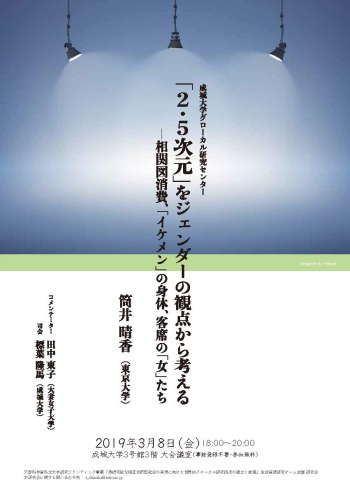

Exploring Gender Through 2.5D: Relationship Consumption, the Anatomy of the Ikemen, and Women as Spectators (The event is now over)
event date: 2019.03.08
Seijo University’s Center for Glocal Studies invites you to a seminar. You do not need to reserve a seat in advance.
The event forms part of MEXT’s Research Branding Program for Private Universities.
Center for Glocal Studies’ Seminar
Exploring Gender Through 2.5D:
Relationship Consumption, the Anatomy of the Ikemen, and Women as Spectators

Date and time : March 8, 2019, 18:00–20:00
No registration is required and admission is free.
Venue : Large lecture hall, Floor 3, Building 3, Seijo University. Directions can be found here. (The venue is a four-minute walk from Seijogakuen-mae Station on the Odakyu Odawara Line.)
Hosted by : Livelihood Resources Team
This event forms part of Seijo University’s MEXT-supported Research Branding Program for Private Universities (a project to establish and promote a world-leading glocal-studies center that contributes toward a sustainable and inclusive society).
Inquiries : r_shineha[at]seijo.ac.jp. *When e-mailing, please replace [at] with @ in the address.
Speaker : Tsutsui Haruka (Department of Biomedical Ethics, Graduate School of Medicine, University of Tokyo)
Commentator : Tohko Tanaka (Department of Communication and Culture, Faculty of Language and Literature, Otsuma Women’s University)
<Outline>
The term “2.5D” has been a media buzzword in Japan for some time now. In Japan, 2.5D typically refers to a musical or other type of stage show based on manga, anime, or video-game source material. (These are called 2.5D shows or 2.5D musicals.) However, the term is sometimes used to refer to an ambiguously defined zone where the “2D” realm of manga, anime, and video games intersects with “3D” reality.
Tsutsui Haruka focused on 2.5D content, particularly the popular genre of stage productions whose cast consists entirely of young male actors. Adopting a gender perspective, Haruka presented several insights into the productions themselves and on the activities of the fan base. As part of this discussion, Haruka introduced Sonoko Azuma’s idea of “relationship consumption” (sōkanzu shōhi)1 as well as the ikemen (“hunk”) trope, described in Ogoe et al. 2014.2
1. Azuma, S., Takarazuka / Yayoi, Ai no Yomigae: Josei to Popyurākaruchā no Shakaigaku [Takarazuka, Yayoi, and Reinterpreted Love: The Social Science of Women and Popular Culture], Shin-yo-sha, 2015.
2. Ogoe, Y., Suzuki, H., Takasugi, M., Ono, K., Sakaguchi, K., Kunishima, N., Ibushi, K., Akutsu, S., Chiba, M., Hoshino, F., Shibata, E., “Ikemen Sutadīzu [Ikemen Studies],” Yūrika [Eureka] (extended edition and special feature), Seidosha, September 2014.
The content of the lecture was based on a modified and extended version of a lecture titled “2.5D and Gender” delivered at the first “Gender Research Salon,” which Nagoya University’s Gender Research Library held in December 2018.